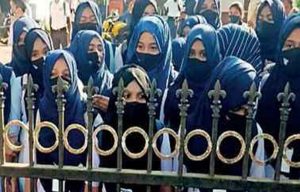 BENGALURU: The Karnataka High Court on Tuesday dismissed various pleas challenging a ban on Hijab in education institutions and said that wearing it is not an essential religious practice of Islam.
BENGALURU: The Karnataka High Court on Tuesday dismissed various pleas challenging a ban on Hijab in education institutions and said that wearing it is not an essential religious practice of Islam.
A bench of Karnataka High Court comprising Chief Justice Ritu Raj Awasthi, Justice Krishna S Dixit, and Justice JM Khazi said that no case is made out for invalidating the Government Order of February 5.The Hijab row had erupted in January this year when the Government PU College in Udupi allegedly barred six girls wearing the hijab from entering. Following this, the girls sat in protest outside the collge over being denied entry.
After this, boys of several colleges in Udupi started attending classes wearing saffron scarves. This protest spread to other parts of the state as well leading to protests and agitations in several places in Karnataka.
As a result, the Karnataka government said that all students must adhere to the uniform and banned both hijab and saffron scarves till an expert committee decides on the issue. On February 5, the pre-University education board released a circular stating that the students can only wear the uniform approved by the school administration and no other religious attire will be allowed in colleges.
The order stated that in case a uniform is not prescribed by management committees, then students should wear dresses that go well with the idea of equality and unity, and does not disturb the social order.
A batch of petitions was filed against the government’s rule in the Karnataka High Court by some girls seeking permission to wear the hijab in educational institutions.
A bench of Karnataka High Court comprising Chief Justice Ritu Raj Awasthi, Justice Krishna S Dixit, and Justice JM Khazi heard the petitions challenging the government rule on dress code.
On February 10, the high court issued an interim order stating that said students should not wear any religious attire to classes till the court issues the final order. The hearings related to the Hijab case were concluded on February 25 and the court had reserved its judgement.
